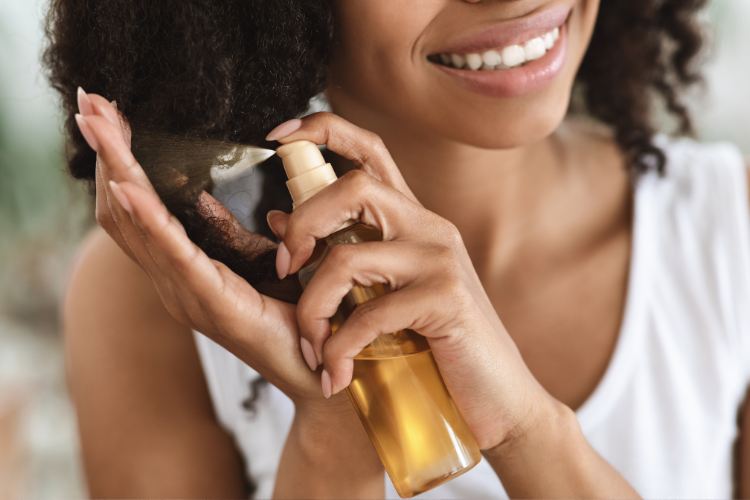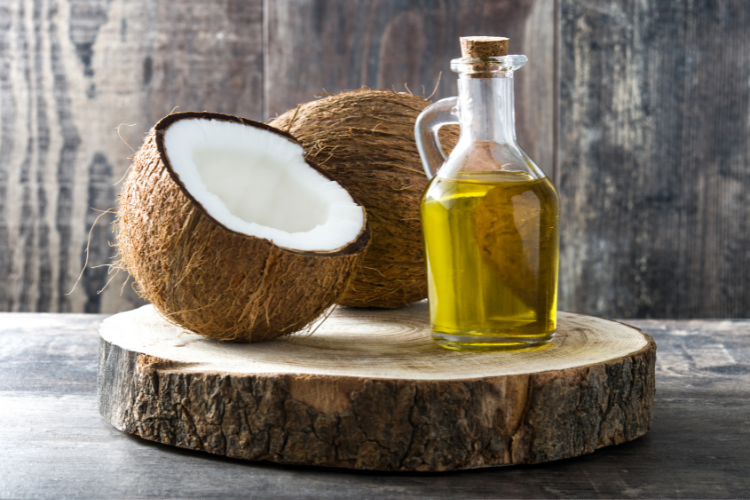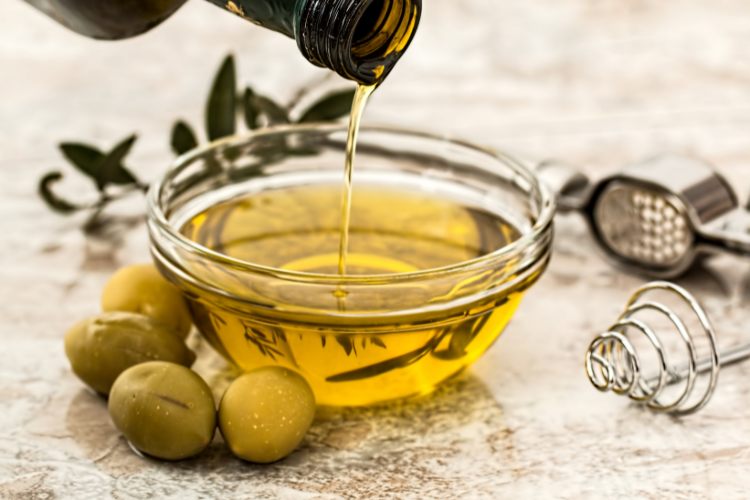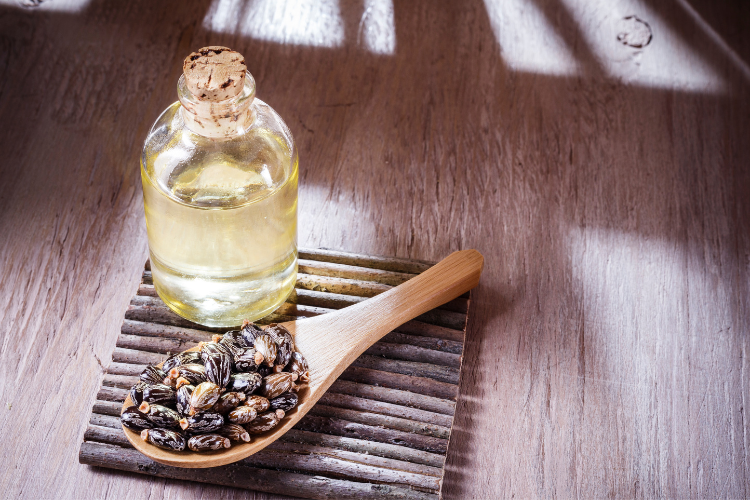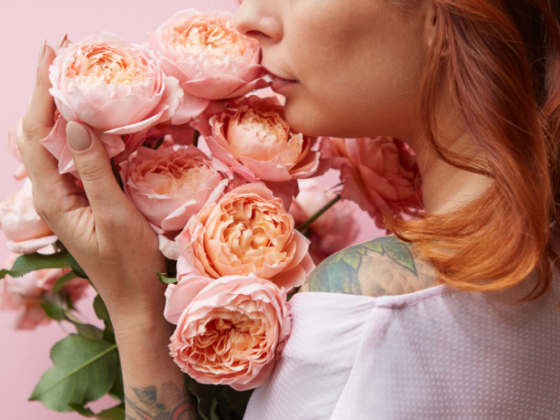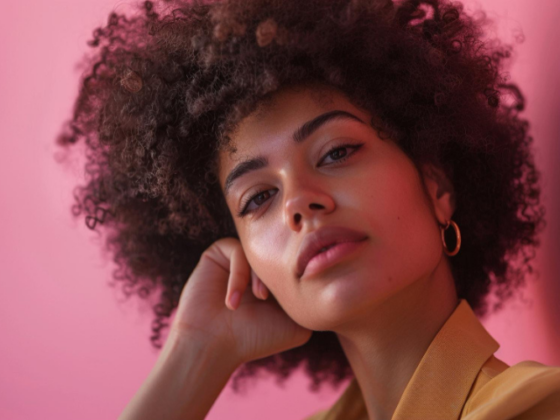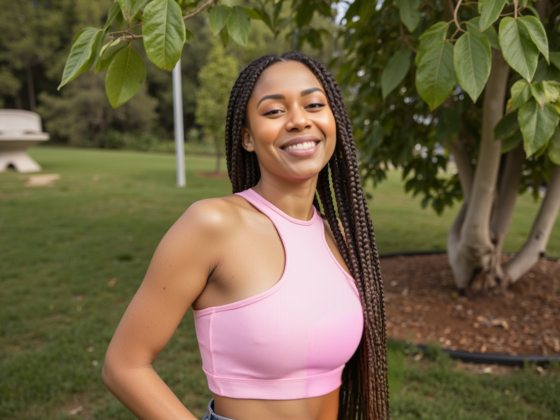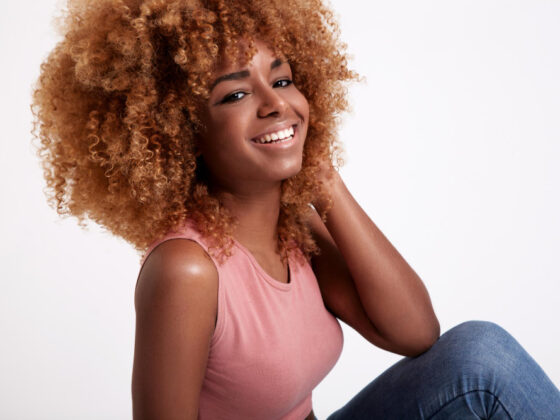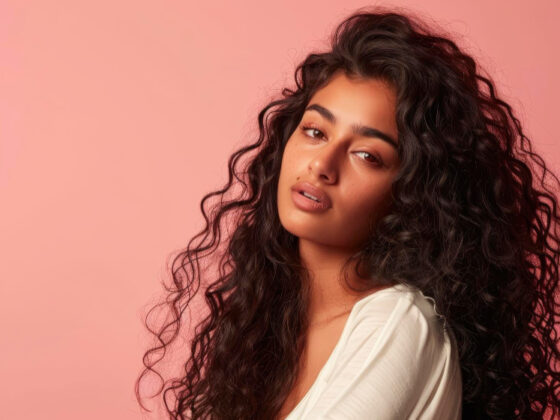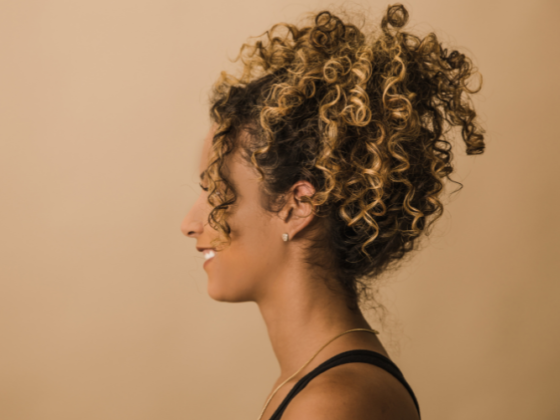Yesterday, I realized my curls were super dry.
I was trying on clothes at the mall and I noticed my curls weren’t clumping and looked frazzled. My skin looked dry too.
I realized that I hadn’t pre-pooed in a month and I needed to drink a lot of water.
Apart from drinking water – which is super essential for having hydrated and moisturized hair, you also need to pre-poo your hair.
I pre-pooed today morning and my hair is super moisturized – my curls look so much better.
And in this post, I’ll talk more about prepooing and the best oils to do that.
Not every oil suits everyone – we need to find oils that work for our types of hair.
So, I’ll list out the benefits of each oil and you can choose the oil that works for your hair!
Let’s begin.
This post contains affiliate links, meaning I may make a commission at no extra cost to you if you decide to click on a link and purchase something. Click here to read the full disclaimer.
What is pre-poo?
Pre-poo simply means pre-shampoo aka “before shampoo.” Pre-pooing, also known as pre-shampooing, is a hair care practice that involves applying oil or conditioning treatment to the hair before shampooing.
The reason why pre-pooing is important is because shampoos are very drying for the hair.
Yes, they clean the hair and scalp and remove all build-up but it also removes a lot of moisture from the hair.
When you pre-poo your hair, you’re giving your hair a chance to retain a lot of moisture even after shampooing.
This helps your hair stay moisturized, strong, and smooth.
Regular shampooing without pre-pooing can lead to dry and brittle hair that snaps off easily.
Pre-pooing is especially useful if:
- You have textured hair – curly/kinky hair
- You have very thick hair that is constantly dry
- You have high-porosity hair (your hair absorbs and loses moisture quickly)
Pre-pooing helps restore dry and damaged hair mainly by making it soft, moisturized, and smooth.
If you have very curly and wavy hair, pre-pooing will make detangling a lot easier – your fingers will glide easily through your curls and you won’t have as many tangles because your hair is moisturized and silky smooth.
How do you pre-poo with oil?
It is best to pre-poo your hair when it’s dry and detangled.
This will give the coconut oil a chance to get absorbed in your hair properly.
When your hair is already wet, it’s already absorbed moisture and won’t be able to absorb the oil – thus making it difficult to reap any of the pre-poo benefits.
To make sure that your hair absorbs the oil best, spray some water on your hair using a mist spray like this after you’ve applied oil and cover your head with a plastic disposable cap.
The heat generated from your scalp will make the absorption process faster and easier!
How long should I pre-poo with oil?
Anywhere between 30 minutes to 2 hours is good and this will give your hair enough time to absorb the coconut oil and reap all the benefits of the pre-poo.
You can leave the oil in your hair for up to 2 hours – not more than that.
Do not leave any oil in your hair for more than 2 hours because it not only doesn’t do anything (your hair will have absorbed how much it could) but it makes it difficult to wash off.
You will have to use more shampoo – which will adversely dry your hair. And this will do more damage than good.
7 Best Oils for Pre Pooing Your Hair
Some oils (carrier oils) have larger molecules and are very thick that doesn’t penetrate the hair shaft easily. So, with some carrier oils, you’ll have to use an essential oil so that you can reap the benefits better.
I’ll explain this shortly.
Let’s look at some of the best oils for prepooing.
1. Coconut oil
I’ve already written an in-depth post on pre-pooing with coconut oil.
Coconut oil is one of the best protective oils for hair. So, it makes a good pre-pooing treatment for hair.
I honestly love coconut oil and olive oil because they work immensely well for my hair.
It can be used for all hair types – especially textured hair.
Coconut oil as a pre-poo method has multiple benefits:
- Deep moisturization: Coconut oil (fractionated coconut oil) has a unique ability to penetrate the hair shaft and provide deep moisturization from within. It helps to prevent the loss of protein in the hair, when you shampoo your hair. By moisturizing the hair, coconut oil helps to keep it hydrated, soft, and less prone to dryness and breakage.
- Protection from damage: The structure of coconut oil allows it to form a protective barrier around the hair strands, shielding the hair from the harsh effects of shampooing. Shampoos, especially those containing sulfates, can strip the hair of its natural oils and moisture, leaving it dry and brittle.
- Strengthens the hair: Coconut oil contains essential fatty acids, such as lauric acid, which have been shown to penetrate the hair shaft and improve its strength and elasticity. This can reduce breakage and split ends, leading to overall healthier and stronger hair.
- Adds shine and luster: Coconut oil has a natural ability to enhance the hair’s shine and luster. By coating the hair strands and smoothing the cuticles, coconut oil reflects light, making the hair appear glossy and vibrant. This is one of the main reasons why South Indians and Sri Lankans have such beautiful, long hair.
However, if you are using coconut oil as a pre-poo for low-porosity hair, make sure you use fractionated coconut oil because low-porosity hair can’t absorb the big molecules of normal coconut oil.
2. Avocado oil
Avocado oil is also extremely nourishing.
Not only is avocado really tasty and buttery – the oil has a lot of nutrients and vitamins that really nourish the hair from within.
Here are a few benefits of avocado oil as a pre-poo treatment:
- Deep conditioning and moisturization: Avocado oil is rich in monounsaturated fats and vitamins A, D, and E, which deeply moisturize and condition the hair. It penetrates the hair shaft, providing intense hydration and nourishment to dry, damaged, or frizzy hair. The oil helps to restore moisture balance, leaving the hair soft, smooth, and more manageable.
- Improves hair strength and elasticity: Avocado oil contains essential fatty acids. This strengthens the hair strands, improves elasticity, and reduces breakage. If you use avocado oil as a pre-poo treatment 2-3 times a month, you can make your hair healthier and shinier over time.
- It improves scalp health: It has moisturizing properties that help soothe dryness. The oil’s antioxidants and anti-inflammatory properties will help you avoid dandruff or a dry and itchy scalp. So, if you suffer from a dry scalp and live in a very cold and dry climate – avocado oil will work wonderfully for you.
Now because avocado oil has larger molecules, you can mix it with an essential oil like lavender oil to reap the benefits better.
When you’re buying avocado oil, get a bottle like this (with a dispenser) from a reputed brand so you’re getting unfiltered avocado oil that you can use without making a mess.
If you find the oil too thick for your hair, mix it with an essential oil like lavender oil.
3. Jojoba Oil
Now, jojoba oil can be used directly and absorbs into the hair very easily unlike coconut oil or avocado oil.
You don’t need to use much too – just a few drops will suffice!
Jojoba oil is slightly more expensive but if you have damaged hair or textured hair that’s dry and needs repair (due to heat damage or dying earlier), then there is no better oil than jojoba oil – trust me.
Now, jojoba oil for me helped me with hair loss and also helped my hair density get a lot thicker.
I’ve heard that a lot of people who have been losing hair (especially at the sides and in the front of the head) have seen great results after using jojoba oil religiously.
I cannot guarantee these results – but it did work for me.
Here are some benefits of using jojoba oil as a pre-poo:
- It helps in scalp balancing: Jojoba oil has a structure similar to the natural sebum produced by our scalp. This similarity allows jojoba oil to mimic the scalp’s natural oils and help balance oil production. Applying jojoba oil as a pre-poo treatment can regulate the scalp’s oiliness, preventing it from becoming too dry or too oily. This balance promotes a healthier scalp environment for optimal hair growth.
- It moisturizes hair: Jojoba oil is an excellent moisturizer for the hair and scalp. It helps to lock in moisture and prevent water loss, keeping the hair strands hydrated and nourished. The oil’s emollient properties provide a protective coating on the hair, preventing moisture from escaping during the shampooing process and reducing dryness and brittleness – similar to coconut oil.
- Improves hair texture: Jojoba oil can help improve hair texture by softening and smoothing hair cuticles. This can make the hair appear shinier, smoother, and more manageable. The oil’s lubricating properties also aid in detangling, reducing friction and breakage during the pre-poo and subsequent washing process.
- Strengthens and Protects: Jojoba oil is rich in vitamins and minerals, including vitamin E, which is known for its antioxidant properties. These antioxidants help protect the hair from damage caused by environmental stressors, such as UV radiation and pollution. Additionally, the nourishing properties of jojoba oil can help strengthen the hair strands, reducing breakage and promoting overall hair health.
I highly recommend jojoba oil for curly and textured hair. I’ve noticed that my hair got so much stronger when I used it.
Jojoba oil can be expensive but give it a try and see if it works for you, before you dismiss it. When buying jojoba oil, make sure you get organic jojoba oil from a reputed brand.
4. Red Onion oil
I know this oil isn’t talked about frequently – I only discovered it last year because it took India up by storm and it was well-deserving.
This was an age-old method for hair loss – crushing onions and then using the juice to help with hair loss and hair regeneration.
However, it’s time-consuming and messy – not to mention it can really make you cry as you’re preparing and applying it.
Enter – Packaged Onion oil.
It’s not expensive – you can also use it directly and wash it off after 30 minutes.
I started using this last year and have seen immense improvement in my hair – my curls clump so much better and I’ve seen my hair get soft and manageable.
It doesn’t smell as bad after you shampoo your hair but if you can tolerate the smell for just half an hour before shampooing – it’s totally worth it.
Some benefits of onion oil are:
- Hair growth stimulation: Onion oil is believed to stimulate hair growth – I’ve personally seen amazing results. It contains sulfur compounds, such as sulfur-containing amino acids, which are essential for the production of keratin—a protein that makes up the hair structure. These compounds may promote blood circulation to the hair follicles, potentially encouraging hair growth and preventing hair loss.
- Nutrient supply: Onion oil is rich in nutrients that are beneficial for hair health. It contains vitamins A, C, and E, which are antioxidants that help combat free radicals and promote a healthy scalp. Additionally, onion oil contains minerals like sulfur, iron, and zinc, which also help in hair growth!
- Scalp Health: Onion oil may help improve scalp health. It has antimicrobial properties that can help combat scalp infections caused by fungi or bacteria. And if you use it 1-2 times a week, you’ll notice less dandruff, and scalp infections, and your overall scalp health will improve.
- Hair Strength and Thickness: The sulfur compounds present in onion oil are believed to strengthen the hair strands and improve their thickness. This can contribute to reducing hair breakage, making the hair appear thicker and healthier – believe me, it works!
The only downfall to using onion oil is the smell – but the pros definitely make up for it, I feel.
5. Argan Oil
One of the main benefits of using argan oil is that it smells like perfume.
It doesn’t have that typical vegetable oil smell like onion oil or coconut oil.
It’s a very light and fragrant oil that is derived from nuts – so if you have a nut allergy – please don’t use it.
Here are some of the benefits of using argan oil for hair:
- Deep conditioning and moisturization: Argan oil is rich in fatty acids, particularly oleic and linoleic acids, which provide deep hydration and moisture to the hair. It penetrates the hair shaft, nourishing and revitalizing dry, brittle, and damaged hair. The oil’s emollient properties help to seal in moisture, leaving the hair soft, smooth, and manageable.
- Frizz Control and Smoothing: Most of us curly girls use argan oil to scrunch out the cast after applying the gel. This oil has the ability to soften hair and prevent frizz – making it effective in taming unruly hair and reducing frizz. It helps to smoothen the hair cuticles, preventing moisture loss and creating a sleeker appearance. By applying argan oil to your hair either before or after shampooing – you can tame your frizz!
- Protection from Heat and Environmental Damage: Argan oil forms a protective barrier around the hair strands, shielding them from heat-styling tools and environmental stressors. It helps to minimize damage caused by excessive heat, UV rays, and pollutants, reducing the risk of dryness, breakage, and color fading.
You can use it as a pre-poo treatment as well – just apply it on your hair 2 hours before shampooing and then shampoo and rinse out normally.
I’ve tried many brands but only this Argan Oil from Morroco is the one I truly love.
6. Olive oil
Okay, I’ve mentioned this before – but I love using olive oil for conditioning and making my hair super soft and shiny.
I take a little bowl and mix 2 tablespoons of olive oil with honey and then apply it to my hair like a mask.
After about 30 minutes, I wash it off normally and shampoo my hair.
I’m not kidding when I say that this makes your hair so soft and silky – give it a try.
Here are some of the benefits of olive oil:
- Deep Conditioning: Olive oil is a rich source of antioxidants, vitamins, and fatty acids that deeply condition and moisturize the hair. It helps to nourish and hydrate dry, damaged, or frizzy hair, leaving it softer, smoother, and much more manageable.
- It’s a natural oil: Olive oil is a natural and readily available ingredient that can be used in pre-poo treatments. It does not contain harsh chemicals or additives, making it a gentle option for those with sensitive scalps or those seeking natural hair care alternatives. Now, if you’re allergic to argan oil or can’t use onion oil because it’s too smelly, then olive oil will be perfect for you.
- Improved hair texture: Olive oil can help improve hair texture by smoothening the cuticles and reducing frizz. It adds shine and luster to the hair, making it appear healthier and more vibrant.
- Scalp Health: Olive oil has moisturizing and soothing properties that can benefit the scalp. It helps to alleviate dryness, itchiness, and flakiness, promoting a healthier scalp environment. The oil’s anti-inflammatory properties may also assist in reducing scalp inflammation.
Overall, olive oil may lead you to crave Italian food because of the wonderful smell it has – but it is very beneficial if you have hard or dry hair and want softer, silkier hair.
The only thing you need to be aware of is to use pure organic olive oil – it’s better!
7. Jamaican Black Castor oil
During the whole Devacurl incident, a lot of women (including me) got a bad batch of products that caused balding and scalp issues.
Either way, I was frantically looking for a quick solution to hairloss and I stumbled upon the Jamaican Black Castor Oil.
Jamaican Black Castor Oil is thicker and has a darker color due to the ash content, while cold-pressed castor oil is lighter in color and consistency.
I noticed that my hair was thinning at the sides and using Jamaican black castor oil really helped me – the hair receding stopped considerably.
Here are a few benefits of Jamaican black castor oil:
- Improves scalp health: JBCO has natural antibacterial and antifungal properties that can help maintain a healthy scalp. It helps to combat scalp infections, such as dandruff or fungal overgrowth, which can inhibit hair growth especially when used as a pre-poo treatment.
- It stimulates hair growth: JBCO is believed to stimulate hair growth. It is rich in ricinoleic acid, which has been shown to promote blood circulation to the hair follicles. Improved blood flow can nourish the hair follicles, leading to healthier and potentially faster hair growth. Regular use of JBCO in pre-poo treatments may help improve hair density and thickness over time.
- It helps your hair retain moisture: JBCO is a highly viscous oil that provides deep moisture to the hair strands. It acts as an emollient, sealing in moisture and preventing water loss during the pre-poo treatment. This helps to keep the hair hydrated, especially when exposed to the drying effects of shampooing and cleansing.
- Strengthens hair: The nutrients present in JBCO, including omega-6 fatty acids and vitamin E, help strengthen the hair strands. This can lead to reduced breakage and improve overall hair health. JBCO’s conditioning properties also help to soften and smoothen the hair, making it more manageable.
Like Argan oil, this oil is also expensive – but nothing quite compares to the benefits Jamaican Black Castor Oil gives.
It’s unlike any other oil and has all the benefits packed in 1. I highly recommend this oil if you’re struggling with hair loss:
This oil does have a weird smell – so if you’re unable to bear it, mix it with some peppermint oil.
Conclusion
I’ve personally used all 7 of these oils for pre-pooing so this post is based on my personal experience and results.
As I said before, if you’re looking for stronger hair overall, you can use:
- Coconut oil
- Avocado oil
- Red onion oil
If you’re looking for softer and silkier hair, then go for:
- Olive oil
- Argan oil
- Castor Oil
If you are suffering from hair loss, then use:
- Jojoba oil
- Red onion oil
- Castor oil
Most of the oils on this list will improve your hair quality – I highly recommend using a pre-poo treatment at least 2 times a month and then slowly building up from there.
Overall, it’s important to just build a routine first that’s extremely sustainable – this is the key to having healthy and thick hair.
Here are some more posts you may find helpful:

